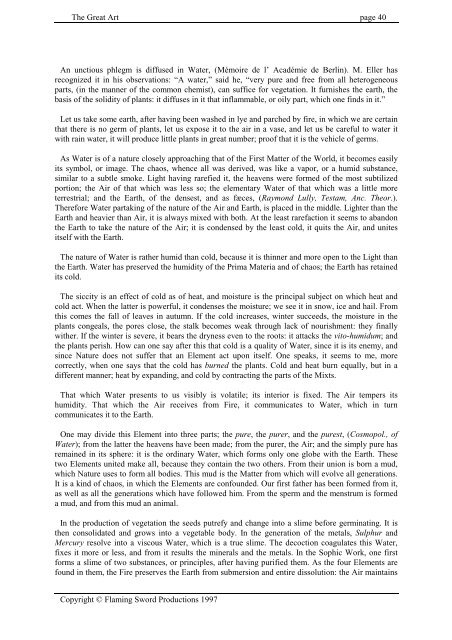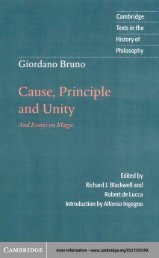The Great Art
You also want an ePaper? Increase the reach of your titles
YUMPU automatically turns print PDFs into web optimized ePapers that Google loves.
<strong>The</strong> <strong>Great</strong> <strong>Art</strong> page 40<br />
An unctious phlegm is diffused in Water, (Mémoire de l’ Académie de Berlin). M. Eller has<br />
recognized it in his observations: “A water,” said he, “very pure and free from all heterogeneous<br />
parts, (in the manner of the common chemist), can suffice for vegetation. It furnishes the earth, the<br />
basis of the solidity of plants: it diffuses in it that inflammable, or oily part, which one finds in it.”<br />
Let us take some earth, after having been washed in lye and parched by fire, in which we are certain<br />
that there is no germ of plants, let us expose it to the air in a vase, and let us be careful to water it<br />
with rain water, it will produce little plants in great number; proof that it is the vehicle of germs.<br />
As Water is of a nature closely approaching that of the First Matter of the World, it becomes easily<br />
its symbol, or image. <strong>The</strong> chaos, whence all was derived, was like a vapor, or a humid substance,<br />
similar to a subtle smoke. Light having rarefied it, the heavens were formed of the most subtilized<br />
portion; the Air of that which was less so; the elementary Water of that which was a little more<br />
terrestrial; and the Earth, of the densest, and as fæces, (Raymond Lully, Testam, Anc. <strong>The</strong>or.).<br />
<strong>The</strong>refore Water partaking of the nature of the Air and Earth, is placed in the middle. Lighter than the<br />
Earth and heavier than Air, it is always mixed with both. At the least rarefaction it seems to abandon<br />
the Earth to take the nature of the Air; it is condensed by the least cold, it quits the Air, and unites<br />
itself with the Earth.<br />
<strong>The</strong> nature of Water is rather humid than cold, because it is thinner and more open to the Light than<br />
the Earth. Water has preserved the humidity of the Prima Materia and of chaos; the Earth has retained<br />
its cold.<br />
<strong>The</strong> siccity is an effect of cold as of heat, and moisture is the principal subject on which heat and<br />
cold act. When the latter is powerful, it condenses the moisture; we see it in snow, ice and hail. From<br />
this comes the fall of leaves in autumn. If the cold increases, winter succeeds, the moisture in the<br />
plants congeals, the pores close, the stalk becomes weak through lack of nourishment: they finally<br />
wither. If the winter is severe, it bears the dryness even to the roots: it attacks the vito-humidum; and<br />
the plants perish. How can one say after this that cold is a quality of Water, since it is its enemy, and<br />
since Nature does not suffer that an Element act upon itself. One speaks, it seems to me, more<br />
correctly, when one says that the cold has burned the plants. Cold and heat burn equally, but in a<br />
different manner; heat by expanding, and cold by contracting the parts of the Mixts.<br />
That which Water presents to us visibly is volatile; its interior is fixed. <strong>The</strong> Air tempers its<br />
humidity. That which the Air receives from Fire, it communicates to Water, which in turn<br />
communicates it to the Earth.<br />
One may divide this Element into three parts; the pure, the purer, and the purest, (Cosmopol., of<br />
Water); from the latter the heavens have been made; from the purer, the Air; and the simply pure has<br />
remained in its sphere: it is the ordinary Water, which forms only one globe with the Earth. <strong>The</strong>se<br />
two Elements united make all, because they contain the two others. From their union is born a mud,<br />
which Nature uses to form all bodies. This mud is the Matter from which will evolve all generations.<br />
It is a kind of chaos, in which the Elements are confounded. Our first father has been formed from it,<br />
as well as all the generations which have followed him. From the sperm and the menstrum is formed<br />
a mud, and from this mud an animal.<br />
In the production of vegetation the seeds putrefy and change into a slime before germinating. It is<br />
then consolidated and grows into a vegetable body. In the generation of the metals, Sulphur and<br />
Mercury resolve into a viscous Water, which is a true slime. <strong>The</strong> decoction coagulates this Water,<br />
fixes it more or less, and from it results the minerals and the metals. In the Sophic Work, one first<br />
forms a slime of two substances, or principles, after having purified them. As the four Elements are<br />
found in them, the Fire preserves the Earth from submersion and entire dissolution: the Air maintains<br />
Copyright © Flaming Sword Productions 1997

















